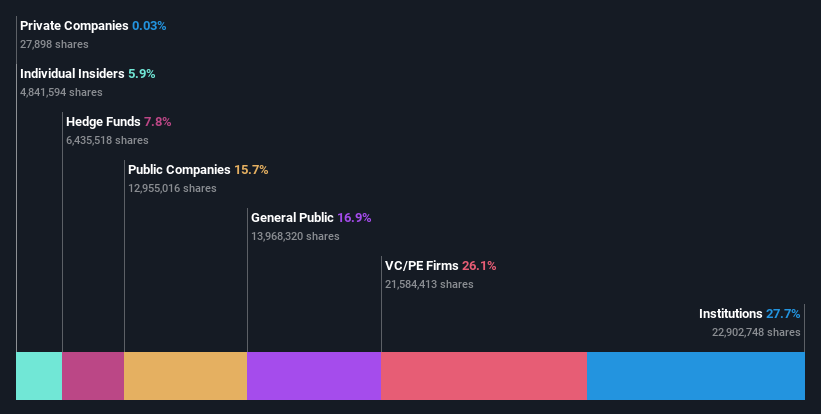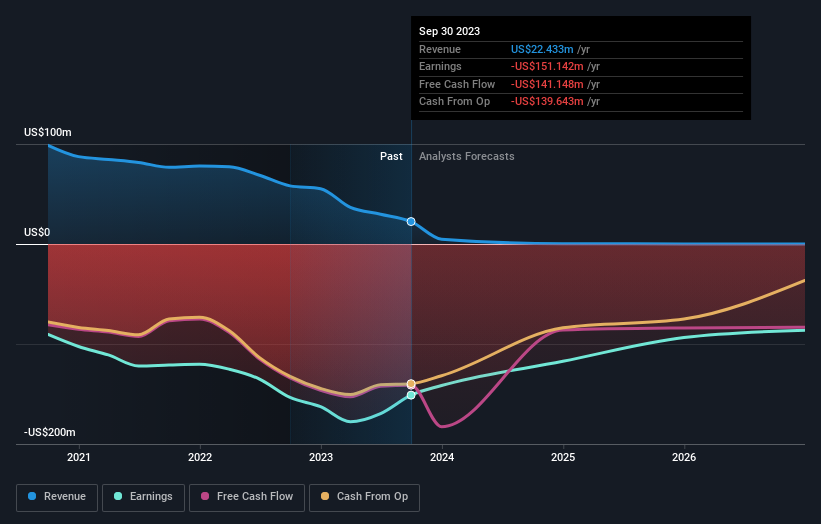Great week for NGM Biopharmaceuticals, Inc. (NASDAQ:NGM) institutional investors after losing 75% over the previous year
Key Insights
Given the large stake in the stock by institutions, NGM Biopharmaceuticals' stock price might be vulnerable to their trading decisions
54% of the business is held by the top 4 shareholders
To get a sense of who is truly in control of NGM Biopharmaceuticals, Inc. (NASDAQ:NGM), it is important to understand the ownership structure of the business. With 28% stake, institutions possess the maximum shares in the company. Put another way, the group faces the maximum upside potential (or downside risk).
Institutional investors would appreciate the 39% increase in share price last week, given their one-year losses have totalled a disappointing 75%.
In the chart below, we zoom in on the different ownership groups of NGM Biopharmaceuticals.
View our latest analysis for NGM Biopharmaceuticals
What Does The Institutional Ownership Tell Us About NGM Biopharmaceuticals?
Many institutions measure their performance against an index that approximates the local market. So they usually pay more attention to companies that are included in major indices.
We can see that NGM Biopharmaceuticals does have institutional investors; and they hold a good portion of the company's stock. This suggests some credibility amongst professional investors. But we can't rely on that fact alone since institutions make bad investments sometimes, just like everyone does. It is not uncommon to see a big share price drop if two large institutional investors try to sell out of a stock at the same time. So it is worth checking the past earnings trajectory of NGM Biopharmaceuticals, (below). Of course, keep in mind that there are other factors to consider, too.
It looks like hedge funds own 7.8% of NGM Biopharmaceuticals shares. That's interesting, because hedge funds can be quite active and activist. Many look for medium term catalysts that will drive the share price higher. The Column Group Management LP is currently the largest shareholder, with 26% of shares outstanding. For context, the second largest shareholder holds about 16% of the shares outstanding, followed by an ownership of 7.8% by the third-largest shareholder.
To make our study more interesting, we found that the top 4 shareholders control more than half of the company which implies that this group has considerable sway over the company's decision-making.
While studying institutional ownership for a company can add value to your research, it is also a good practice to research analyst recommendations to get a deeper understand of a stock's expected performance. There are a reasonable number of analysts covering the stock, so it might be useful to find out their aggregate view on the future.
Insider Ownership Of NGM Biopharmaceuticals
The definition of an insider can differ slightly between different countries, but members of the board of directors always count. Management ultimately answers to the board. However, it is not uncommon for managers to be executive board members, especially if they are a founder or the CEO.
Insider ownership is positive when it signals leadership are thinking like the true owners of the company. However, high insider ownership can also give immense power to a small group within the company. This can be negative in some circumstances.
Our most recent data indicates that insiders own some shares in NGM Biopharmaceuticals, Inc.. As individuals, the insiders collectively own US$6.1m worth of the US$103m company. It is good to see some investment by insiders, but we usually like to see higher insider holdings. It might be worth checking if those insiders have been buying.
General Public Ownership
The general public, who are usually individual investors, hold a 17% stake in NGM Biopharmaceuticals. While this size of ownership may not be enough to sway a policy decision in their favour, they can still make a collective impact on company policies.
Private Equity Ownership
Private equity firms hold a 26% stake in NGM Biopharmaceuticals. This suggests they can be influential in key policy decisions. Some might like this, because private equity are sometimes activists who hold management accountable. But other times, private equity is selling out, having taking the company public.
Public Company Ownership
Public companies currently own 16% of NGM Biopharmaceuticals stock. We can't be certain but it is quite possible this is a strategic stake. The businesses may be similar, or work together.
Next Steps:
It's always worth thinking about the different groups who own shares in a company. But to understand NGM Biopharmaceuticals better, we need to consider many other factors. For instance, we've identified 2 warning signs for NGM Biopharmaceuticals (1 makes us a bit uncomfortable) that you should be aware of.
But ultimately it is the future, not the past, that will determine how well the owners of this business will do. Therefore we think it advisable to take a look at this free report showing whether analysts are predicting a brighter future.
NB: Figures in this article are calculated using data from the last twelve months, which refer to the 12-month period ending on the last date of the month the financial statement is dated. This may not be consistent with full year annual report figures.
Have feedback on this article? Concerned about the content? Get in touch with us directly. Alternatively, email editorial-team (at) simplywallst.com.
This article by Simply Wall St is general in nature. We provide commentary based on historical data and analyst forecasts only using an unbiased methodology and our articles are not intended to be financial advice. It does not constitute a recommendation to buy or sell any stock, and does not take account of your objectives, or your financial situation. We aim to bring you long-term focused analysis driven by fundamental data. Note that our analysis may not factor in the latest price-sensitive company announcements or qualitative material. Simply Wall St has no position in any stocks mentioned.


